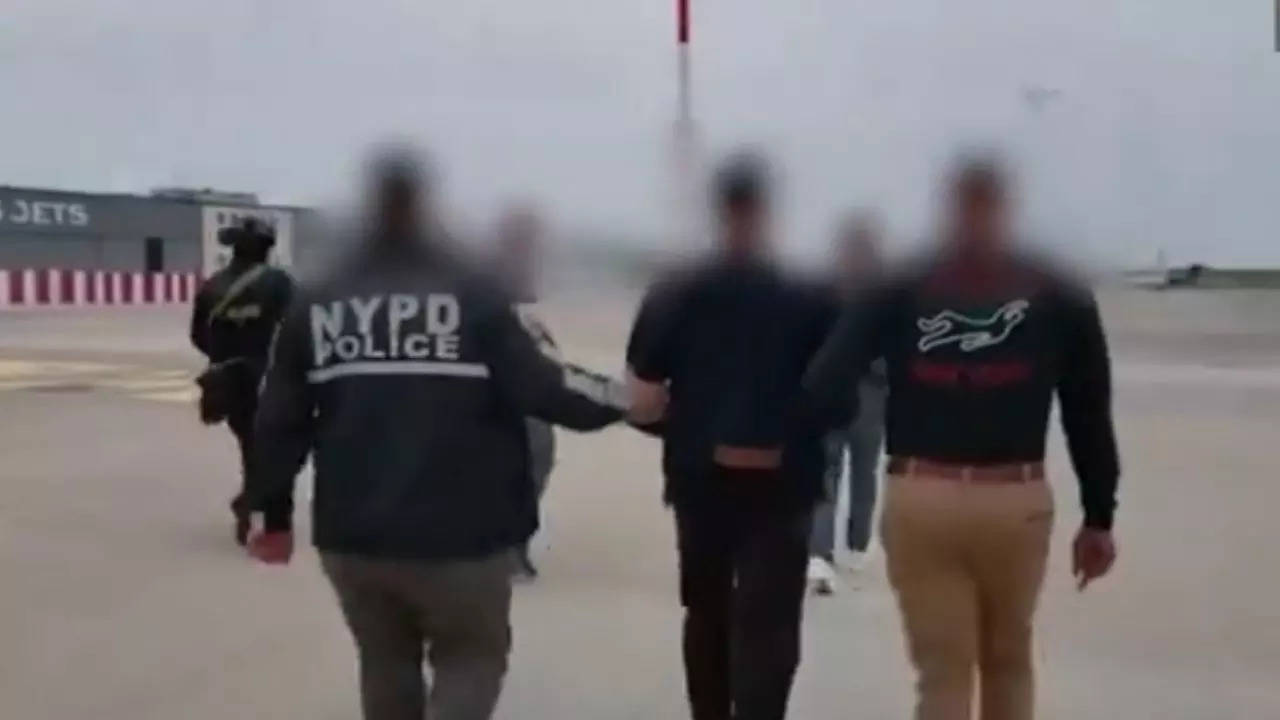Nikhil GuptaThe Indian national at the centre of an India-US diplomatic row over an alleged foiled plot to kill a Khalistani separatist was extradited to the US by the Czech Republic last week, bringing the issue back into the spotlight after the lull ahead of India’s elections.
Gupta had allegedly hired an assassin to murder Gurpatwant Singh Pannu on US soil at the behest of an Indian government official.Pannu is a Sikh separatist who holds dual US-Canadian citizenship. According to the US Justice Department, Pannu is an American citizen and political activist who was targeted for exercising “a quintessential American right: his freedom of expression.” Gupta has pleaded innocent.
The Czech Justice Ministry’s announcement about Gupta’s extradition coincided with the arrival in India of US NSA Jake Sullivan, the White House point man leading the efforts to bring the alleged mastermind of the conspiracy to justice. The main purpose of Sullivan’s visit was to review the Initiative on Critical and Emerging Technologies (ICET) with his Indian counterpart Ajit Doval. However, an interesting series of events took place before his arrival.
Gupta’s extradition was approved by Czech authorities on June 3, a day before the results of the Lok Sabha elections were announced in India. Eleven days later, and just three days before Sullivan’s visit, Gupta was flown to the US on a special flight from Prague.
These revelations were made by Czech Justice Minister Pavel Blazek on the day Sullivan arrived here. On the same day, a group of Democrat senators in the US wrote a letter to Secretary of State Antony Blinken demanding a strong response to alleged Indian involvement in the conspiracy.
These developments saw the assassination-for-hire plot cast a shadow over Sullivan’s activities here, even though both sides pulled a fifth when the issue was raised in the talks. Media coverage focused more on the Pannun case than the ICET talks, in which both sides pledged to take action to eliminate regulatory barriers against strategic technology cooperation. Sullivan did not interact with the media during his visit, which is rare for a top US official. Even without this, the sequence of events leading up to the visit, either deliberately or by outright coincidence, brought the Pannun plot to the fore, as Washington seeks action against the India-based conspirators.
New Delhi is likely to face more pressure in the coming months to take action against the Indian official already identified in the Washington Post report. The US Justice Department considers Gupta’s extradition an important step towards justice and has said it will not tolerate attempts to silence or harm American citizens. The Indian government formed a committee in November to investigate the US allegations, but it has not yet made public any of its findings. This could be unsettling as the Joe Biden administration itself is under renewed pressure to seek accountability from India.
A group of Democrat senators led by Jeff Merkley, who is also a senior member of the Senate Foreign Relations Committee, wrote to Blinken calling for a strong diplomatic response in the wake of “credible allegations” about the involvement of an Indian official in the plot. They want a clear message to be sent to India that such behaviour will have consequences. Since the US elections are still some time away, it is too early for India to think about waiting for the storm to blow over. The Pannun case is also not just an isolated case. India is facing similar allegations by Canada for the killing of another Khalistani separatist, while an Australian media outlet recently claimed to have exposed how Indian spies targeted Sikh separatists in Australia, a report which India on Friday said was completely false.
While it may seem that the relationship between the two countries is going to have its ups and downs, it seems unlikely that the two countries will let the Pannun issue derail their partnership for “global good”. A mature and nuanced India-US relationship, which External Affairs Minister S Jaishankar calls structurally robust, should be able to weather some ups and downs if handled carefully.
This is reflected in how – unlike the situation between India and Canada – the two sides have quietly worked together without publicly sparring over the Pannun case. Jaishankar has said that unlike Canada, the US does not defend extremism in the name of freedom of expression. It is also significant that Sullivan did not speak publicly about the case, which was widely expected of him during his visit. Of course, there will be apprehensions that the US could use the case as a bargaining chip to gain concessions on contentious issues, especially in the economic sphere.
Both sides also need each other – the US needs a strong bulwark against China’s growing aggression in the Indo-Pacific, and India needs access to cutting-edge technology essential for its growth and security. During Sullivan’s visit, both sides reaffirmed their commitment to iCET, the next big thing that could serve as a guiding framework for further development of the relationship.
That being said, India will have to find a way to address the US quest for justice in this case. The issue has been raised at the highest level and given the tone and tenor of the voices emerging from the US, particularly from the Justice Department, the Biden administration will have no choice but to work with India to take this matter to its logical conclusion, which is criminal prosecution of those allegedly hatching the conspiracy from India. As the senators warn in their letter to Blinken, any attempt at scapegoating – such as blaming only one rogue operative – may not work.
Gupta had allegedly hired an assassin to murder Gurpatwant Singh Pannu on US soil at the behest of an Indian government official.Pannu is a Sikh separatist who holds dual US-Canadian citizenship. According to the US Justice Department, Pannu is an American citizen and political activist who was targeted for exercising “a quintessential American right: his freedom of expression.” Gupta has pleaded innocent.
The Czech Justice Ministry’s announcement about Gupta’s extradition coincided with the arrival in India of US NSA Jake Sullivan, the White House point man leading the efforts to bring the alleged mastermind of the conspiracy to justice. The main purpose of Sullivan’s visit was to review the Initiative on Critical and Emerging Technologies (ICET) with his Indian counterpart Ajit Doval. However, an interesting series of events took place before his arrival.
Gupta’s extradition was approved by Czech authorities on June 3, a day before the results of the Lok Sabha elections were announced in India. Eleven days later, and just three days before Sullivan’s visit, Gupta was flown to the US on a special flight from Prague.
These revelations were made by Czech Justice Minister Pavel Blazek on the day Sullivan arrived here. On the same day, a group of Democrat senators in the US wrote a letter to Secretary of State Antony Blinken demanding a strong response to alleged Indian involvement in the conspiracy.
These developments saw the assassination-for-hire plot cast a shadow over Sullivan’s activities here, even though both sides pulled a fifth when the issue was raised in the talks. Media coverage focused more on the Pannun case than the ICET talks, in which both sides pledged to take action to eliminate regulatory barriers against strategic technology cooperation. Sullivan did not interact with the media during his visit, which is rare for a top US official. Even without this, the sequence of events leading up to the visit, either deliberately or by outright coincidence, brought the Pannun plot to the fore, as Washington seeks action against the India-based conspirators.
New Delhi is likely to face more pressure in the coming months to take action against the Indian official already identified in the Washington Post report. The US Justice Department considers Gupta’s extradition an important step towards justice and has said it will not tolerate attempts to silence or harm American citizens. The Indian government formed a committee in November to investigate the US allegations, but it has not yet made public any of its findings. This could be unsettling as the Joe Biden administration itself is under renewed pressure to seek accountability from India.
A group of Democrat senators led by Jeff Merkley, who is also a senior member of the Senate Foreign Relations Committee, wrote to Blinken calling for a strong diplomatic response in the wake of “credible allegations” about the involvement of an Indian official in the plot. They want a clear message to be sent to India that such behaviour will have consequences. Since the US elections are still some time away, it is too early for India to think about waiting for the storm to blow over. The Pannun case is also not just an isolated case. India is facing similar allegations by Canada for the killing of another Khalistani separatist, while an Australian media outlet recently claimed to have exposed how Indian spies targeted Sikh separatists in Australia, a report which India on Friday said was completely false.
While it may seem that the relationship between the two countries is going to have its ups and downs, it seems unlikely that the two countries will let the Pannun issue derail their partnership for “global good”. A mature and nuanced India-US relationship, which External Affairs Minister S Jaishankar calls structurally robust, should be able to weather some ups and downs if handled carefully.
This is reflected in how – unlike the situation between India and Canada – the two sides have quietly worked together without publicly sparring over the Pannun case. Jaishankar has said that unlike Canada, the US does not defend extremism in the name of freedom of expression. It is also significant that Sullivan did not speak publicly about the case, which was widely expected of him during his visit. Of course, there will be apprehensions that the US could use the case as a bargaining chip to gain concessions on contentious issues, especially in the economic sphere.
Both sides also need each other – the US needs a strong bulwark against China’s growing aggression in the Indo-Pacific, and India needs access to cutting-edge technology essential for its growth and security. During Sullivan’s visit, both sides reaffirmed their commitment to iCET, the next big thing that could serve as a guiding framework for further development of the relationship.
That being said, India will have to find a way to address the US quest for justice in this case. The issue has been raised at the highest level and given the tone and tenor of the voices emerging from the US, particularly from the Justice Department, the Biden administration will have no choice but to work with India to take this matter to its logical conclusion, which is criminal prosecution of those allegedly hatching the conspiracy from India. As the senators warn in their letter to Blinken, any attempt at scapegoating – such as blaming only one rogue operative – may not work.
















